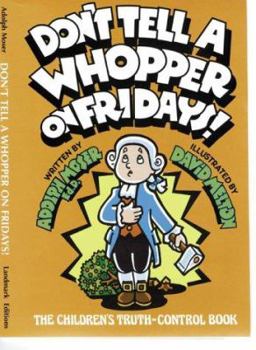Don't Tell a Whopper on Fridays: The Children's Truth Control Book
Select Format
Select Condition 
Book Overview
Suggesting ways that can help children tell the truth instead of lying, Dr. Moser and David Melton make their point with humorous illustrations and informative text. Full color. This description may be from another edition of this product.
Format:Hardcover
Language:English
ISBN:0933849761
ISBN13:9780933849761
Release Date:January 1999
Publisher:Landmark Editions
Length:61 Pages
Weight:0.68 lbs.
Dimensions:0.4" x 6.2" x 9.2"
Age Range:9 to 12 years
Grade Range:Grades 4 to 7
Customer Reviews
5 ratings
Great for helping your kids "get" what fibbing can do.....
Published by Thriftbooks.com User , 16 years ago
This book was great in hitting home the consequences of fibbing. When reading how the book portrays it, I think my son finally got how other people reacted to him not telling the truth. Surprisingly, he really reduced the amount of tall tales he told. If you are having troubles with dishonesty, I would recommend this as a good read that is amusing, yet enlightening, without being all "lecture".
Great teaching tool
Published by Thriftbooks.com User , 16 years ago
I work in an ICF-DD. I have been searching for tools to teach social skills and this series filled this need perfectly. Residents enjoy reading or listening to these books being read. The pictures are humorous and the text holds their interest.
Don't Tell A Whooper on Friday!
Published by Thriftbooks.com User , 17 years ago
Excellent book for children and families dealing with anger-management and strong emotions. It's a great book children can read on their own, have it read to them as well as an excellent book for families to read together. A must have book and must have series!
Why lying is silly
Published by Thriftbooks.com User , 22 years ago
A pediatrician I knew often told parents that all children lie. It may be a learned behavior, but for some reason all kids learn to do it by the time they are two. The hard part is teaching them to unlearn.This 61-page picture book contains simple language easily read by first and second graders (on a par with Dr. Suess), but its sophistication about children's propensity to lie will keep them coming back until they are approaching middle school. The premise is simple: While everyone, even the author, has told some lies--"I'm late because my watch stopped, I did not spend my lunch money on candy"--most people need to tell the truth to feel good about themselves. People get along much better in life if they tell the truth. The book explains that there a lot of different kinds of lies, and a lot of reasons that people tell them. "Some people can look at others, face to face and they can tell an enormous WHOPPER. But when others lie, their faces get red, and they have to turn to look away." People lie because they don't want to tell the truth, don't want to admit that they have done something wrong, prefer to blame others, think it will get them out of trouble. Lying, on the contrary, often gets people into even more trouble.Some of Moser's books are funny. Not this one. But Moser does make even adults look silly when they lie. A car salesman looks ridiculous telling his customer "This car is in perfect condition." A politician, who promises, if elected, to raise only wages, but never to raise taxes, looks silly too. So does the kid who tells his friends that his uncle was an explorer before becoming an astronaut and a movie star.Next, kids learn about why it's important not to lie. First, liars need good memories, so they can remember who they lied to and what they told them. Otherwise, they'll get confused and will soon be caught in their lies. Worrying about this makes some liars unable to eat or sleep. It even makes them worry that people will stop believing or lose respect for them. If people want respect and trust from others, Moser tells kids, "you must apologize for lying and tell the truth." Telling the truth, he concludes, is "like ice skating--the more you do it, the easier it becomes." Once kids have digested this message, they tell the truth more often, and have every reason to feel proud. Alyssa A. Lappen
I reviewed this book and thought it was great.
Published by Thriftbooks.com User , 25 years ago
Recently, I reviewed Don't Tell a Whopper on Fridays!, and Iwas impressed with Dr. Moser's hepful words and colorful, attention-catching illustrations. I had tried to keep copies of his earlier Emotional Impact Series books in my office waiting room, but they quickly disappeared. During the brief periods that the books from Dr. Moser's emotional Impact Series stayed in my waiting room, parents and children were always reading them before appiontments.They often wanted to discuss them in detail in my office.The popularity of Dr. Moser's books among my patients was amazing. I'd kept story books and children's magazines in my waiting room for years. They never disappeared, just Dr. Moser's books did. i no longer have a private practice , but I imagine that Don't Tell a Whopper on Friday! would myster vanish just as fast as Dr. Moser's other books.





